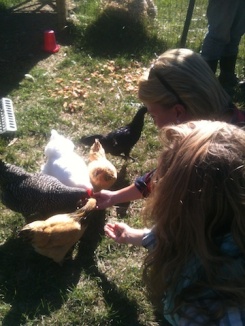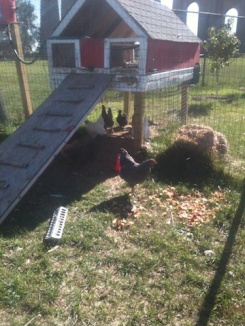Nahir S. Pérez Soto considers hosting chickens at our city’s farms.

I remember growing up and visiting my grandma’s farm in a town called Arroyo in Puerto Rico, where I grew up. My older cousins used to warn me about petting the chickens. Rayna, (one of my cousins) would tell us the story of how one of the mama hens had once chased after her pecking to protect the little chick that Rayna had tried to pet. After hearing this story, I kept my distance from the chickens, but have never lost my curiosity about them.
As part of the Intro to Urban Agriculture class the NYU Urban Farm Lab, us student farmers take field trips to urban farms around the city to connect with other farms and farmers. For our first trip of the year, we went to the urban farm on Randall’s Island. The farmers welcomed us and started showing us around. They had just finished making apple cider that day and were going to feed the leftover scraps to their chickens. Yes, that’s right; there were chickens in the city.
At one end of the farm was the pen where the chickens roamed freely and their pretty red chicken coup. This is where all nine chickens — Skeeter, Pepper, Ms. Scarlet, Madame Burns, Lucille and Bella, Chickpea, Gov, and Bagel — lived.

Bagel was my personal favorite: a Black Silkie Bantam with a Mohawk, which I found very rock and roll. We went into the pen and to my delight, farmer Nick gave us feed to give to the chickens, which crowded around us and gently pecked at our palms until it was all gone.
After this encounter, I decided to do some research on how to keep chickens in the city, and took a look at New York’s ordinance for chickens.
Things to keep in mind:
1. Roosters are not allowed, only hens.
2. The number of hens you can keep is not specified or limited; as long as they don’t become nuisance.
3. Make sure the chickens stay on your property. Be aware of property lines.
4. Check with your neighbors if it is okay with them. (They can consider the smell or noise to be nuisance and call the police.) I’d suggest bribing them with eggs.
5. Space is important. They need a covered coop with enough space, perching and nesting boxes. They also need space ‘outside’ preferably with dirt so that they can feed on worms and insects.
6. Cleanliness. Coops need to be cleaned frequently and their food and water needs to be changed at least once a day.
7. They lay two eggs every three days.
8. Chickens also need time and money
And here is a video about a New Jersey chicken coop, which offers tips and tricks on keeping chickens: